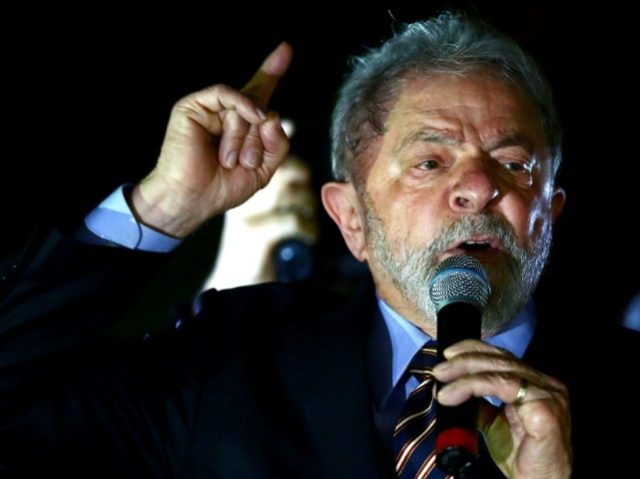A majority of the three judges presiding over his case in Brazil’s appellate court have not only upheld a ten-year prison sentence for former president and current presidential frontrunner Luiz Inácio Lula da Silva, they have demanded that sentence extend to twelve years.
Lula, as he is popularly referred to in Brazil, served as Brazil’s chief executive from 2003 to 2011, during which dozens of politicians and private businessmen have been found to have been engaging in a sprawling corruption scheme Brazilian prosecutors have dubbed “Operation Car Wash.”
As president, Lula and his Workers’ Party (PT) became darlings of the international left. The New York Times, which has referred to Lula as a “leftist lion” and his corruption as “relatively modest,” published an opinion piece Wednesday arguing that an appellate conviction of Lula would make Brazil’s democracy “weaker than it has been since military rule ended,” attacking Sergio Moro as openly partisan, and claiming an election without Lula “could have very little legitimacy.”
The PT has called for street protests in support of Lula.
At press time, only two of three judges on the appellate court have voted to uphold the sentence, but the court only needs a simple majority to do so.
Federal Judge Sergio Moro, who has become a hero among anti-corruption protesters in the country, sentenced Lula to almost ten years in prison in July after prosecutors argued that Lula had personally benefitted from “Operation Car Wash.” The Operation required politicians to hand over vastly over-charged government contracts to private contractors, who would then pocket part of the profits and kick some of the money back to the politicians. Lula was found guilty of using some of the money to buy a beachfront “triplex” property, and of laundering the money once he received it.
The day after his sentence, he announced he was running in the 2018 presidential election.
“If someone thinks that, with that conviction, they got me out of the game, they can know that I’m in the game!” he told supporters.
“More important than the triplex accusation is that of placing the president as guarantor of a criminal organization and the profiting off of political capital that this permits,” appellate judge Leandro Paulsen told the court, according to the Brazilian newspaper O Globo. “But the triplex is also important because it also shows that there was personal benefit and that Lula had knowledge of the general account of bribery.”
Lula still has a final right of appeal and will be allowed to run for office if his sentence is ultimately overturned.
Prior to the appellate hearing, Lula told reporters outside the courthouse that he was “extremely calm” and that he had “absolute certainty that I did not commit any crime.”
The head of the PT, Senator Gleisi Hoffman, called for street protests after receiving word of Lula’s sentence.
“We will radicalize,” Hoffman said. “We will not leave the streets.”
The streets have not been kind to the PT in the past two years. Lula’s successor and former Minister of Energy, Dilma Rousseff, was impeached out of office in 2016 after millions of Brazilians took the streets demanding her impeachment. While she ran the government’s energy policy during the Petrobras scandal, she has not stood accused of corruption tied to “Operation Car Wash.”
The two men officially remaining in the 2018 race, should Lula’s sentence be affirmed yet again, are former president Fernando Collor de Mello—who defeated Lula in the 1989 presidential race only to be impeached into resignation—and conservative lawmaker Jair Bolsonaro. Brazilians go to the polls in October.

COMMENTS
Please let us know if you're having issues with commenting.